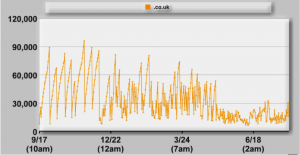This post was originally written for the Safe Space Write-A-Thon website. If you fancy having a go at writing and raising money for a good cause, have a look at the site and get going!
I ain’t no expert and have no great experience but this is just how I see things.
So, you’ve written a book. Well done. Seriously, well done. It’s not easy. You’ve typed “The End”, you’ve edited, you’ve proof read, you’ve fought off the demon that tries to tell you it’s rubbish, you’ve slumped on the ground fulfilled but tired like Frodo after he tossed the ring into the fire.
Now what?
You’re initial reaction may simply be “Can I have my life back now?” Do that first. Talk to everyone you’ve ignored, feed your increasingly skinny looking cat, empty a bin or two. You’ll need things in order as the next bit needs a calm collected head.
There is a recurring question that will endlessly circle your head. “How good is it really?” Most of your head will tell you it’s not very good, all your friends and family will tell you you’re a genius and there is always that little bit of “I might win the lottery” part of your brain that considers the possibility that you’re on your way to buying the house next door J.K. Rowling so you can extend her tree house complex to look like something out of Avatar.
And here’s the really tricky bit. All of that spectrum is possible. I’m sorry to say that your book might be rubbish. A commendable effort but not everyone is wired like Dickens. But, here’s the thing, it might just be great.
And here’s the really annoying bit. It might be great but that, in itself, ain’t enough. Yeah, yeah, start shouting sentences at me that start “But surely…”. True, great books will, generally, eventually get a publisher. But there must be great books lying about that never made it because the author gave up before their luck broke.
Luck is a big part of it. And part of that luck is timing. Publishing is a business, it sets out to make money. Books that will sell are, inevitably, far more appealing to publishers than books that are good/worthy/artistic/great. Sure, you can have both, but how often?
Try this wee game. Walk into Waterstones and pick up a few books, read the back and make too simple assessments.
- Does this look like a great book?
- Why did the publisher put the book out?
I bet that, for most of the books you look at, the answers will be:
- No.
- People like that kind of thing.
So, I’m going to make a very harsh assumption. I’m going to assume that your book isn’t great. Sorry. But, on the balance of probability, it isn’t. Don’t think me harsh. My book isn’t great either and that is my own assessment. I never did fancy a tree house.
So, think about your book and ask; “Do people like that kind of thing?” And lo and behold, the answer is yes. I’m not Nostradamus. It’s obvious. There are always groups of people for almost any genre. The issue is this. How many people like that genre and, crucially, how does your book stack up against everything else of the same type. Let’s be honest, if you’ve worked out that there’s a market for a given type of book, so has everyone else. A publisher won’t waste money on paper printing a book that has umpteen better version of the same already in the market. So, what is the differentiator in your work? Why does it stand out?
Remember, some publishers, focused on the marketing issue alone won’t go near books unless they know, without doubt, that they can get it into a 3 for 2 deal in a shop. That means your book not only has to be good, a popular genre and be sufficiently different to be interested but it has to sit nicely on a table next to two other books that it might get bought with.
Yeah, I heard your shoulder slump and the long weary sigh. It’s not easy.
Let me tell you about I did.
I made the assessment of my book. I decided it was ok. Competent and interesting enough but unlikely to stand out in it’s genre (let’s say Contemporary Scottish Crime/Thriller Fiction). But, to me, it seemed a shame not to have a brief punt at the tree house so I submitted to a couple of publishers the ones with the least oppressive submission policy) and a couple of agents. All the expected polite letters arrived. They were all lovely. I wasn’t surprised or disappointed. I set my own expectations very harshly. Don’t get my wrong, I actually like my own book but that’s not even remotely close to what publishing is about.
Round about that time, probably some time in 2007, I heard that various self-publishing services were starting to be available in the UK.
Let’s be very clear. There have always been lots of vanity publishing services that will take lots of money from you to produce physical copies of your book with promise of marketing etc. Unless you are particularly nuts, don’t be handing out any money to anyone for anything like this. Just don’t.
I published my book via lulu.com. At the time it wasn’t entirely simple, it has got better since. There are other providers like Lulu, I don’t have experience of using them so I can’t comment on them. Look around, you’ll see what’s available.
I suppose I was lucky in this part of the process. I work in I.T. and take photos so the process of laying out the book, designing the cover etc was pretty straightforward for me. Truth is, it’s not that hard and there are many useful templates etc.
The great thing about these kind of services is that if the extend of your ambition is to be able to stand with a copy of your book in your hand, with your name on the front, smile and say “I wrote that” then you can achieve that for less than a tenner. For no more money, friends and family will be able to get/buy copies too. It’s print on demand, so there is nothing to pay up front, you pay per copy.
Obviously, I wanted to click on more buttons than that so I signed up for a distribution package. That means I registered as a publisher, got my own ISBN range and the book was made available via the standard book distribution processes. That part was a lot of fun. My book kept appearing for sale on many, many random websites around the world. Obviously, no one bought it in Japan/Estonia/wherever – but it was amusing to see it there.
It also meant that I could do silly things like go into Waterstones, search for my book on their computer, bring it up on screen and wander off sniggering like Muttley. Obviously I’m far too mature to have done that. I’m also a liar.
My book is available to buy in many, many places online. There are people selling copies on EBay that cost more than it does from Amazon. I have no idea why. But it’s entertaining. It isn’t, however, lucrative. I didn’t nor did I ever expect to, sell lots of copies of the book. It is entirely a marketing problem. Once the book is available, you don’t suddenly get a flood of sales. You have to put a lot of effort in. And, guess what, I was too busy, too lethargic, too over the whole book writing thing. If you think being bothered to write was hard and making yourself edit even harder, I was even less inclined to do the marketing. I did all the techy based stuff, Facebook ads, Google ads, a website but that was just me being a geek to find out about those things. It wasn’t the sort of exposure you need to sell any books at all. I did sell some, enough for Amazon to always keep 1 or 2 copies in stock but, as you can perhaps tell, I’m not retired yet.
The best thing for me from publishing the book was, as well as having a physical copy to hold, I was also required by law, to send a copy to the British Library. Now, I didn’t need to be asked twice. When I’m long gone and future generations no longer know who I am, my rag-tag collection of swearing and typos will still be sitting somewhere in the bowels of the British Library as proof that I existed. It will very likely remain the only suggestion of permanence that my time on earth will produce – well, at least until the earth itself is swallowed up by the dying sun and my words, along with the rest of humanity are burnt into oblivion. Oh, maybe I didn’t tell you, my book isn’t all that cheery either.
The good thing about the self-publishing world there is an ever-growing community that all has the same basic marketing problem so tends to be very supportive. I stumbled into this because, strangely, of my photography. Self-publishers look for free ways to get decent covers. Because I give all my photography away for free, my photos are quite popular for book covers. If you look on Amazon, at least two of the reviews for my book are from people who bought my book because my photos ended up on the cover of one of theirs and who were supportive enough to not only get my book but to review it.
Also, bear this in mind when looking for a cover, there are lots of great, free photography resources.
Social networks inevitably help a lot, so if you are keen to get behind your book with a big heave of marketing, look at all the social channels and how the self-publishers around the world use them.
Inevitably, your thoughts have to also turn to eBooks. Having just returned from holiday I can stand very immediate testament to the all-pervasive nature of the Kindle. There were more of those adorning the sun loungers than there were paperbacks. So, it would be rude not to.
Having long since ignored by book I was only awoken to the possibilities of eBooks when Lulu published my book to the Apple iStore for me (there’s nothing better to get you going with something than having to put in precisely no effort). Having done that, I lazily investigated the Kindle option one night and, within an hour (yes, really) my book was available on Kindle via Amazon. Kindle Direct Publishing is really easy. Amazon even linked it to the print edition of my book automatically.
The Kindle edition started at £2.99 (the price that Lulu set on the iBookstore). As usual, my somewhat half-hearted attempt at marketing generated a few sales. Then I read something that said it was a good idea to make your eBook cheap for a while as it would ultimately boost sales. So, I dropped the price of the Kindle edition to 85p. Can you spot when I did that in this sales rank graph?
You see, eBooks are weird. If you make them cheap enough people buy them without thinking. There is a threshold under which people don’t really pause before buying. This means that you end up with a lot more sales. But, I suspect, not the same number of people reading the book. If you haven’t spent much on a book you are likely to be less compelled to actually read it. It’s a throwaway investment that doesn’t require any follow-up.
Then a weirder thing happens. Because it’s cheap, you start to sell a few more. And, the more you sell the more you appear in the “Customers who bought this also bought…” bit on Amazon and because it’s cheap (and in my case with enough decent reviews to look less risky) people are prepared to punt 85p on a whim. So, a book that was first published in 2008 has, this year, started to sell 50-60 Kindle copies a month, out of nowhere, with virtually no effort at all. It’s all a little odd.
Obviously, this is still not the kind of money you retire on. In fact, I’ve not even bothered setting things up to receive the few quid that is lying on an Amazon server somewhere. But still, it’s kind fun watching it sell reasonably well after all this time.
So, you’ve written a book. Well done. Seriously, well done.
If you think it’s a work of genius or a marketers dream, try some agents and publishers. How long you do this for will be directly related to how much you believe in what you’ve written. There are many, many stories of countless rejections leading to ultimate stardom. It does happen. There are probably even more, less publicized, stories of countless rejections leading nowhere. You’ll know how far you want to take that.
But what to do if that route isn’t for you or isn’t happening? I would definitely make sure you can get at least 1 copy to hold and point at and say “I did that”. I’d definitely stick a Kindle edition on Amazon, it’s just too easy not to. Self-publishing isn’t a publishing problem, it’s a marketing one, so prepare to get a sandwich board on and stand next to the Golf Sale guy.
However it turns out, you’ve done a great thing. You’ve written a book. I’m excited for you. So much so that I’m even thinking about going back to my pile of notes that represent what could be my next book. I wouldn’t hold your breath though.






Nice follow up article to the ‘Writing Tips For Beginners from a Beginner’ post. The comment about a cheap book threshold is so accurate. I recently obtained a Kindle and a good friend informed me of an email service that notifies of free kindle books. I bought loads to start with, then came the realisation that I can only read so much. So, I reckon a good 60% get scanned over, then binned.
So, perhaps the old quality not quantity adage goes.. This leads me to ask a question: how do you target an audience for your book at a cost that is not only enticing but reflects the books quality?